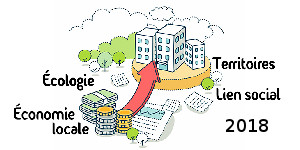MOOC - Complementary currencies

2017-2018 - Implementation of the MOOC Complementary currencies, a new approach to territorial development. What role for local authorities? : CNFPT-INSET of Dunkerque with the participation of the Veblen Institute for Economic Reforms (Veblen)
Local currencies are still often perceived as a gadget, a means of exchange within small communities exchanging working time or a few services. What if they participated in a profound transformation of the approach to territories, exchange and currency? A conception of the organization of exchanges that echoes the emergence of multi-level governance? In any case, local and regional currencies are flourishing in various forms all over the world, they already know how to take advantage of the most modern technical means, electronic purses, telephone payments and are becoming a serious tool at the service of local authorities to boost the local economy, strengthen the community and combat social exclusion.
But to understand its meaning and future, we need to take a new look at money itself, discovering that it is rooted in an economic history that goes back to the Middle Ages, that there can be many forms of it, serving a variety of objectives.
The four-session online conference offers territories and communities wishing to better take their future into their own hands a panorama of objectives, concrete avenues, modalities and practical achievements.
This production can be used in training courses on economic development, social policies and public finance.
(Sessions are only available in French)
Session 1: Keys to understanding money, its functions, its role as a social link
- Everyday Currency
- Currency in Theories
- The Historical Plurality of Currencies
- How multiple currencies coexist
- How to think about the role of money on a local scale?
Session 2 : Complementary currencies in territorial dynamics: panorama, challenges and perspectives.
- Territorial issues: towards a new territorial model ?
– Overview of complementary currencies - The potential of complementary currencies in the face of territorial challenges: the territorialisation of activities
- The potential of complementary currencies in the face of territorial challenges: boosting trade within the territory
- The potential of complementary currencies in the face of territorial challenges: the transformation of practices, lifestyles and social representations
- What role for government?
- Developing the complementary currency project-
Sessions 3 and 4: Complementary currencies in practice.
- Local Currency
- Time banks and time currency
– Introduction to Environmental Coins - Complementary currencies for environmental purposes: the ADEME’s viewpoint
– Mutual Credit and Intercompany Currencies - Hybrid Currencies
- Remembering: the ten-point complementary currency
- Local currencies: Feedback from Eusko Moneta
- Timecurrencies: The French Accorderie Network
- Sonantes Feedback: Combining Corporate Credit with Local Currency
- Experimenting with complementary currencies: the role of local elected officials and territorial authorities
Session 5: Effects and impacts of complementary local currencies.
- Explicit or implicit expectations of local currency
- Perceived effects of local currency
- Conditions to optimize the expected effect of a local currency
- Local Currency Limits
- Transformative or pedagogical power of local currency
All of these sessions are available here